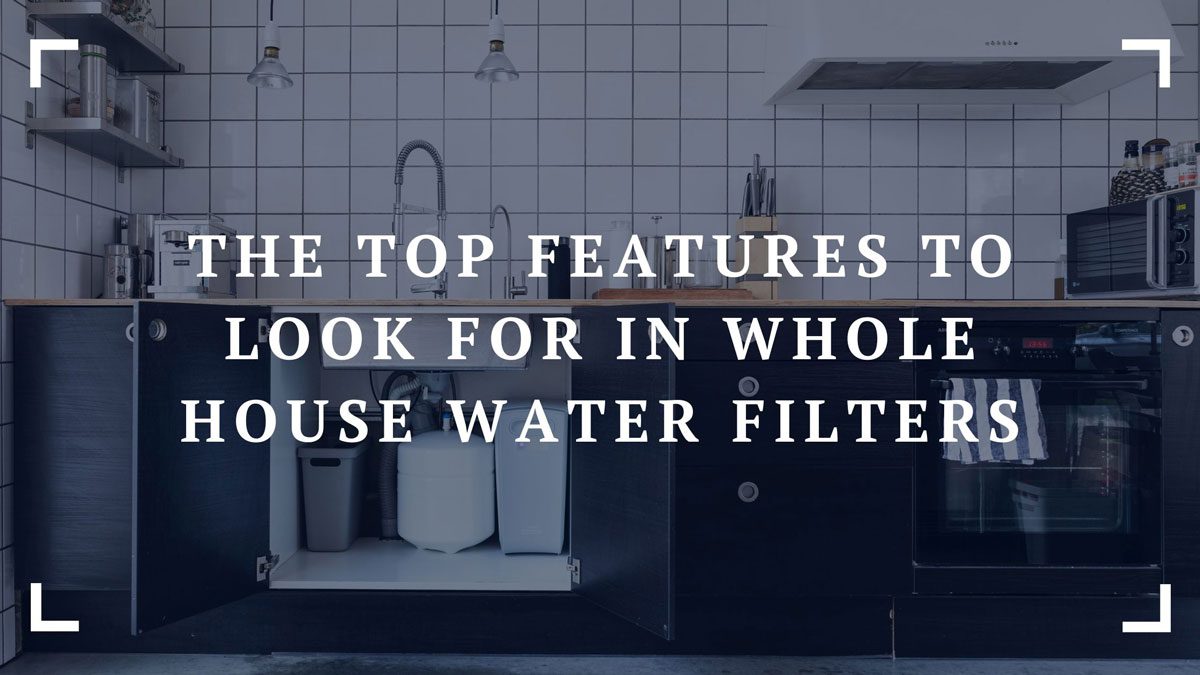The water filtration system market is rising, projected to reach $5.8 billion by 2031. This indicates the increasing importance of clean, safe water at home. However, given the many types of whole house water filtration systems, getting the right one can be taxing. To help, we’ll explore the features to look for in a whole-house filter system. This should simplify your decision-making process. Let’s begin.

What is a Whole House Water Filtration System
A whole-house filtration system cleans water at the main entry point into your home. This system works at the entry point, unlike regular filters focusing on specific sources like faucets. This ensures consistent water quality for all connected fixtures and appliances throughout your household.
How Does a Whole House Water Filter Work
Here’s how this device works. First, a sediment filter removes the bigger particles like sand and dust. Then, an activated carbon filter extracts chemicals to remove bad taste. After that, a reverse osmosis membrane purifies the water, blocking heavy metals, bacteria, and dissolved solids. The final touch is a post-filter, catching any last bits and guaranteeing a clear and clean output.
Filtering Features of the Whole House System
Whole house systems offer several key features to ensure the cleanliness and safety of your drinking source, including.
- Media Filtration. This important feature uses specialized media to eliminate impurities and sediments, enhancing your drinking experience. It also helps protect plumbing from clogging.
- Carbon Filtration. Carbon filters are crucial for eliminating chlorine, VOCs, and chemicals. They also prevent the release of harmful byproducts like THMs.
- Chloramine Removal. Systems with chloramine removal capabilities effectively eliminate this disinfectant, guarding against potential health risks associated with its high consumption.
- Bacteria and Virus Filtration. Advanced technologies like UV sterilization address bacteria and virus filtration, providing extra protection, especially for households in areas prone to contamination.
- Fluoride Removal. Some models offer fluoride removal, allowing you to manage fluoride levels for safer hydration.
Whole House System for Well Water
If your home uses well water, it might contain impurities affecting taste and health. A water treatment system for homes can effectively remove them. It is connected to the main supply to ensure clean and safe water from every tap.
Pros and Cons of Whole House Water Filter
Benefits of Whole House Water Filter
- Improved Quality. They remove contaminants like heavy metals, pesticides, and bacteria. This makes your H2O taste better and safer.
- Enhanced Taste. Many models come with carbon filters that remove chemicals causing bad taste and odor, giving you a fresher and more enjoyable drinking experience.
- Reduced Plumbing Issues. These systems prevent scale and buildup in pipes by removing contaminants, ensuring better flow, and averting potential plumbing problems.
- Health Benefits. These filters lower the risk of diseases caused by contaminants.
- Cost-Effective. One of the benefits of water filtration system is that it saves money. Whole-house filtration reduces your reliance on bottled water. They also use less water compared to individual or point-of-use filters.
Cons of Whole House Filtration System
- Maintenance. You’ll need to keep up with regular maintenance tasks, such as changing the whole house water filter cartridge, cleaning, and system inspections. Neglecting this can result in decreased performance and increased expenses.
- Initial Cost. The installation cost might be steep, but the potential long-term savings and health benefits could outweigh this initial investment.
- Space. Be prepared for the possibility of needing extra space. This could mean modifying your plumbing or setting up a dedicated filtration system.
- Complexity. Whole-house filtration systems can be more complex than individual filters, requiring professional installation and expertise. Troubleshooting and maintenance might need assistance from a qualified technician.
- Intrusive Installation. This equipment is essentially a water filter for home main line, so it will likely involve intrusive procedures — access to your main plumbing — during installation that could inconvenience you, especially if you prioritize privacy in your home.
Is a Whole House Water Filter Worth It
A filtration system, whether whole house water filter city water or well source, can be worth the investment for your household. The key is to be proactive with maintenance and buy whole house water filter replacement cartridges from a reliable source like Filterway to ensure your system’s longevity.
Final Thoughts
In addressing “What does a whole house water filter do?”, it’s clear they are crucial for reducing impurities, improving taste, and mitigating health risks. When selecting one, focus on its contaminant removal capabilities and taste improvement. These factors are vital in choosing a filter that meets your clean and safe water needs.


